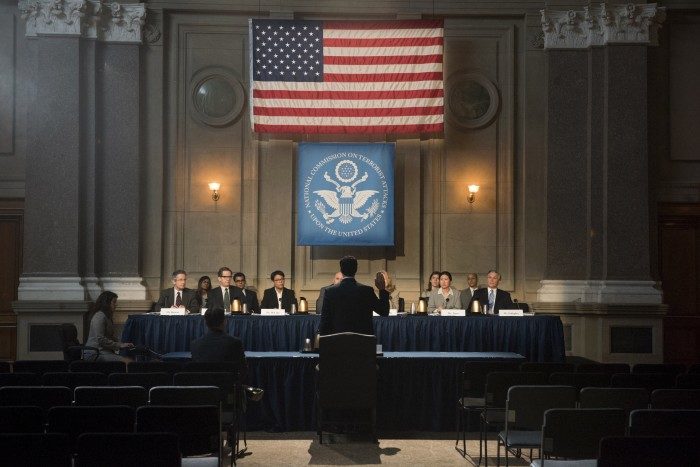First Look UK TV review: The Looming Tower
Review Overview
Premise
10Cast
8Execution
7Martyn Conterio | On 24, Feb 2018
This review is based on the opening episodes of The Looming Tower.
What seems so fresh in our minds, as if it were just yesterday, is today part of early 21st-century history, two decades so far almost entirely dominated by a seemingly endless battle against Islamist terror organisations and wars in the Middle East and Central Asia. The cultural and historical scars of 9/11 are still raw, still mending, still haunting us like an unshakeable nightmare. 20 years ago, nobody outside the intelligence community or security journalists had really heard of Al Qaeda, the terrorist group headed by Osama bin Laden, scion of a billionaire Saudi Arabian family, despite their campaigns against US interests in the mid to late 1990s. But on 11th September 2001 woke the world up to their twisted ideology; bin Laden became a household name, public enemy number one.
We are still very much living with the aftermath of the World Trade Center attack. It’s there in stringent airport security, government snooping of our phone records, internet searches, all described as protecting our “freedom”. That shocking day, which played out live on television, what felt like a blockbuster disaster movie shown in real-time also looked alarmingly real, almost apocalyptic, with the streets of lower Manhattan a fog of dust, as if a locust plague had descended on to NYC; buildings lay in twisted metal ruins and there were numbing scenes of desperate human acts, suicides caught on camera, heroic groups and individuals working all hours to save the lives they could. We all wanted to know why and how, but it would be several years until Lawrence Wright’s Pulitzer Prize-winning non-fiction account, The Looming Tower: Al Qaeda and the Road to 9/11, was published. Now, the 2006 exposé has been adapted into a 10-part Amazon series by actor-turned-screenwriter Dan Futterman.
The book is extraordinary and frightening, offering a history of anti-Western Islamist activities going back to the 1940s and an exchange student who was repulsed by his time in the US. From there, the movement against the West built up and encompassed the game-changing Afghanistan war. The soldiers who dispersed after beating the Russians were looking for new asses to kick, deciding on “The Great Satan” America. But The Looming Tower series cannot possibly fit this riveting backdrop into a 10-hour show, so it begins in 1998, with the embassy bombings in Tanzania and Kenya.
It introduces warring factions in the CIA (represented by Peter Sarsgaard’s Martin Schmidt) and the FBI’s John O’Neill (Jeff Daniels). The lack of internal co-operation between these outfits looks to be a major crux of the drama. Schmidt is playing the long game, looking to take out the head of the hydra, while O’Neill is fixated on subpoenaing the first terrorist he can get his hands on, in the hope they’ll sing like a canary and bring down Al Qaeda like a house of cards.
The first two parts, titled Now It Begins and Losing My Religion, directed by acclaimed documentary filmmaker Alex Gibney and John Dahl, cover the lead up to, and aftermath of, the 1998 East Africa bombings and brings the main players into the frame. The closest to a lead character is Tahar Rahim’s Lebanese-American FBI agent, who works for O’Neill and is one of the few men in the agency who can speak Arabic (according to the show, in the late 1990s, there were just eight Arabic speakers out of 10,000 staff members). Coming on like a Michael Mann thriller crossed with the Jason Bourne movies, the gripping narrative flits around from Washington DC and NYC to Islamabad, London, Nairobi and Tirana, a whirlwind tour of terrorist hotspots or places, where informants and plotters might be uncovered, or a computer hard drive unearthed with info that’ll help the Americans in their quest. Thrillingly urgent with stakes as high as they go, the dialogue works well in getting over complex information relatively clearly. The world is presented in muted greys and steel blues, and there is one scene incorporating a real-life interview with Osama bin Laden and an actor that is seamlessly edited together.
The weakest element is the occasional focus on backstories regarding the lives of the men leading the chase. While Wright’s book touches on this, in a 10-episode season, do we really need to know that O’Neill was a playboy operator with two girlfriends on the go and a wife back home he ignores, or that Ali Soufan (Rahim) is struggling to fit in and in one scene is accused of performative patriotism? All of these things could have been achieved through the pursuit of Osama bin Laden storyline. The inclusion of backstory suggests there were fears that presenting these men and women purely at work would make them unrelatable as humans and characters, but when it’s done so poorly, as in Bill Camp’s subplot, where his FBI agent Robert Chesney romances a woman at the Nairobi embassy, it feels like a bad move – a touch of bland and safe Hollywood thinking, as if some personal investment needs to be put forth for the viewers to feel emotionally attached to these people, when the monumental events of the recent past are being shaped and the memory of 9/11 should be more than enough. Perhaps it was intended as a break or reprieve from the thriller aspects, but it simply stops the plot dead in its tracks.
Despite misgivings about the “men off duty” subplots, though, The Looming Tower could make for a compulsive watch because the talent involved is strong. It’s great watching Daniels and Sarsgaard chew the scenery, hurling foul-mouthed insults at each other from across the desk, and Rahim brings sensitivity to his portrayal of Soufan. For those who haven’t read Wright’s book, this series might come as a deep shock, depicting security agencies not as incompetent, but definitely at loggerheads.
The Looming Tower is available on Amazon Prime Video, as part of a £5.99 monthly subscription.























